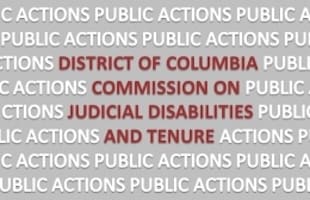And the do-nothing GOP Congress does nothing while the Democrat party of treason steamrolls over the American people.
Dangerous D.C. Court Reappointment System Usurps President’s Authority
By: Michael A. Fragoso and Zack Smith, The Federalist, May 29, 2025
Law and order in the District of Columbia is a disgrace, in no small part because of its activist local judges chosen and reappointed through an unconstitutional process.
The District of Columbia court system is an unconstitutional mess. The idea that the president can only nominate candidates to the bench from a preselected list provided by a commission over which he has no control clearly violates the Constitution’s appointments clause.
But somehow the process of reappointment in the District of Columbia is even worse. There, a similarly bizarre committee (the Commission on Judicial Disabilities and Tenure) evaluates judges whose terms have expired, after which it can usurp the president’s nomination and appointment powers as well as short-circuit the advice and consent function of the Senate.
In other words, this commission — and this commission alone — can decide whether judges will continue to serve despite what the president, the Senate, or the people the president and Senate serve want.
President Trump and Attorney General Bondi should consider taking action to remedy this constitutional abomination.
Judges for the District of Columbia’s “local” courts are appointed for 15-year terms, after which — if they’re not too old — they come up for reappointment. Under Section 433(c) of the D.C. Self-Government and Governmental Reorganization Act, a judge who’s up for reappointment is evaluated by the Commission on Judicial Disabilities and Tenure (CJDT). The CJDT reviews the judge’s record and seeks feedback from outside parties.
The CJDT then renders one of three verdicts on the judge, each with its own result: If its review finds the judge to be “well qualified,” then “the term of such declaring candidate shall be automatically extended for another full term.” If its review finds the judge to be “qualified,” then the president has the option to renominate the judge for Senate confirmation again. If its review finds the judge to be “unqualified,” then the president shall not renominate him and “such judge shall not be eligible for reappointment or appointment.”
This statutory scheme is obviously unconstitutional. Both the “well qualified” and “unqualified” consequences violate every element of the appointments clause: A “well qualified” judge is simply reappointed by fiat of the CJDT. This removes the president entirely from the appointments process and the Senate from giving its advice and consent.
Similarly, an “unqualified” rating means the president can neither reappoint a judge nor nominate and appoint him with the advice and consent of the Senate. The CJDT simply decides who can or cannot be a federal judge. (The Supreme Court has hinted that “local” D.C. judges might exercise some judicial power other than the federal judicial power, but this is wrong.)
Not only does this reappointment regime arrogate core executive power from the president, it does so by giving that power to a body on which he has only token representation.
The CJDT is made up of seven members, only one of whom is chosen by the president. The current presidential appointment is Tom Fitton of Judicial Watch, and his term ends in November of this year. The rest of the commission is appointed by the D.C. Bar, the D.C. City Council, the D.C. mayor, and the chief judge of D.C.’s U.S. District Court — which, as shown in the case of the Judicial Nominating Commission, presents its own problems. Indeed, this interbranch power arrogation is only compounded by the fact that one of the D.C. City Council appointees is Dr. Patrick Jackson, husband of Justice Ketanji Brown Jackson.
Because both the nomination and appointment of judges are core Article II powers, having that power exercised by an independent body wholly outside the president’s control is constitutionally untenable. In many ways this is even worse than the unconstitutional judicial-nomination system in D.C.
This has disastrous real-world consequences. Just recently the CJDT deemed Judge Todd Edelman of the D.C. Superior Court “well qualified” and therefore reappointed him. Those who follow judicial nominations may recall the name because he was nominated to D.C.’s U.S. District Court and returned to President Biden when the Senate refused to confirm him due to his soft-on-crime tenure on the Superior Court. It’s hard to see a problem more glaring than that the CJDT was able to bless someone for a D.C. federal judgeship not long after the Senate refused to confirm him for a different D.C. federal judgeship.
Continued…..

